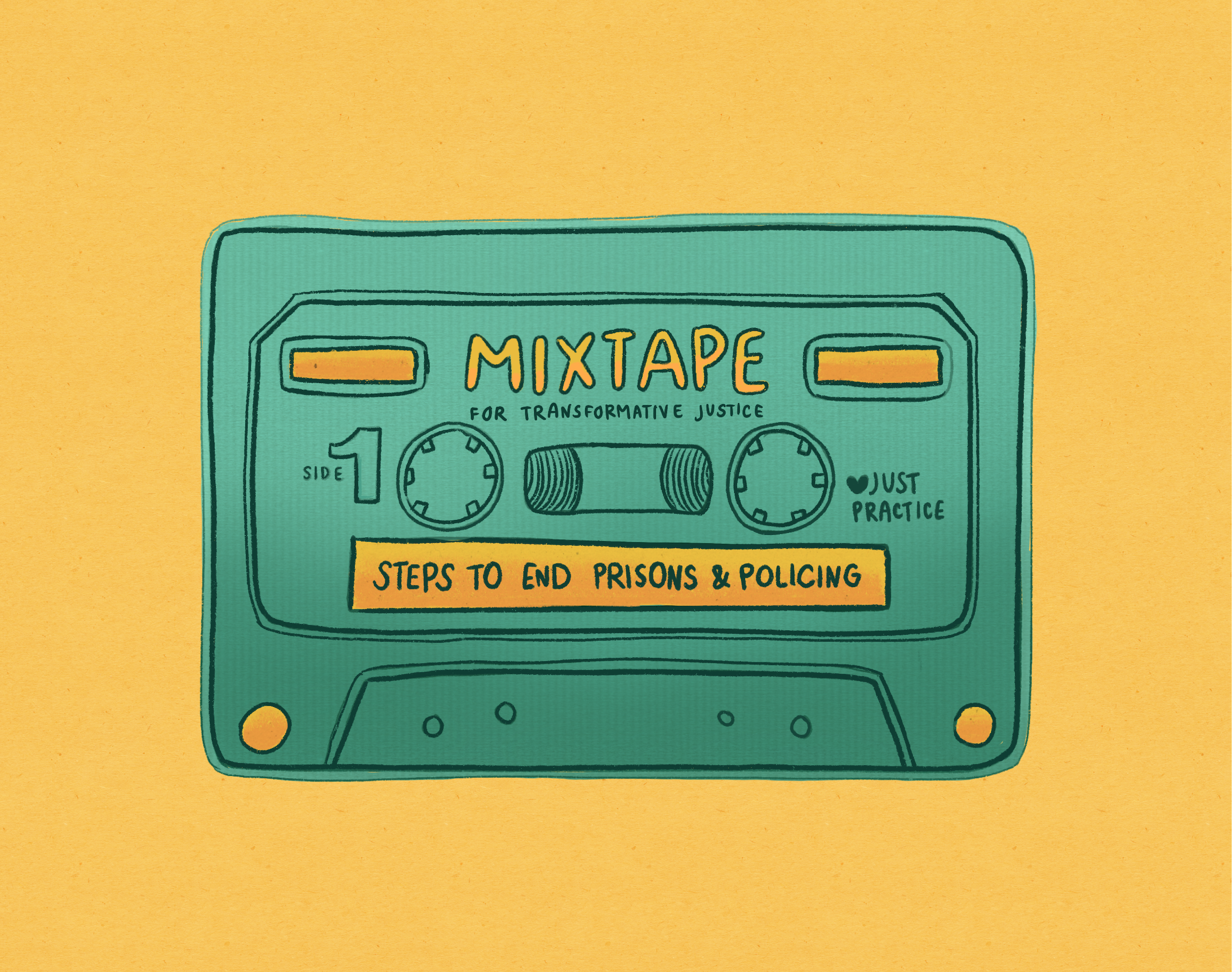Steps to End Prisons & Policing: A Mixtape on Transformative Justice
Artwork by Danbee Kim
Just Practice Collaborative created this Mixtape as an offering in response to the overwhelming number of requests we are getting for training, workshops and support. We want to nourish and care for our abolitionist community with as many resources as we can provide right now.
Learn from some of the people who have been practicing and thinking about and creating organizations around Transformative Justice over the last two decades.
This collection of 9 (!) recorded video workshops or webinars are each between 45-90 minutes long and contain valuable frameworks, real life examples and tools you can use to help strengthen your personal practice and political commitment to this moment.
All tracks have closed captioning.
Get access to the complete package for just $100. We are trying to make this as accessible as we can and we included a payment plan option.
The Mixtape Includes:
Prison Industrial Complex (PIC) Abolition 101: A Vision to End Prisons, Policing & Surveillance- Mariame Kaba
Transformative Justice Intro- Mia Mingus
No Transformative Justice without Harm Reduction -Shira Hassan
Healing Justice: A Political Strategy for Movements- Cara Page & Erica Woodland
Creating Safety Teams and Making Spaces Safer- Ejeris Dixon
Mad World: Psychiatry, Abolition, and New Horizons- Elliot Fukui
How to Support Survivors Who Seek to Hold Harm-Doers Accountable Without Engaging the Police or the State- Shira Hassan & Ejeris Dixon
From Rapid Response to Transformative Justice Processes: Some Basics You Should Know- -Mimi Kim
The Four Parts of Accountability & How to Apologize- Mia Mingus
Plus! A short Bonus Track with Mariame Kaba, Shira Hassan, Deana Lewis & Rachel Caidor.
Track Descriptions:
Prison Industrial Complex (PIC) Abolition 101: A Vision to End Prisons, Policing & Surveillance
Prisons are relatively new experiments. They are not ‘broken’ nor are they rehabilitative. They exist to punish, contain and control. The prison industrial complex (PIC) reinforces and reproduces systems of oppression that perpetuate the violence we experience. The PIC is naturalized and many people struggle to imagine a world without it. In this workshop, we’ll discuss PIC abolition means and how an abolitionist vision and framework is essential to organizing.
Transformative Justice Intro
How do we respond to violence within our own communities without relying on the police, prisons or other state systems? This session will offer a basic introduction to and overview of transformative justice and its core concepts. It is an introduction and will not cover everything within transformative justice. It will be a space for participants to begin thinking about community-based responses to violence.
No Transformative Justice without Harm Reduction
This overview of harm reduction principles, values and practice is essential for anyone who is working on ending the PIC. There is no justice that leaves out people in the sex trade & street economy, drug users and street based young people. Harm reduction is a critical movement tool used for generations to create change, build long-term relationships, and support healing while working to reduce harm in our community.
Healing Justice: A Political Strategy for Movements
This workshop will explore the lineage of healing justice; and ground in the values, purpose and practices of Healing Justice at the intersections of Transformative Justice.
Creating Safety Teams & Making Spaces Safer
Black, Indigenous, and People of Color (BIPOC) communities have created safety outside of the police and prisons for generations. Drawing upon this legacy this workshop will talk through how to build safety teams, strategies to intervene in violence in the moment, and plans to make meetings, groups, and events safer.
Mad World: Psychiatry, Abolition, and New Horizons
Psychiatry and psych wards are tools of the police state. Join Elliott Fukui for a webinar about disability justice and abolition. In this current political moment, we need to raise awareness about the inner workings of the mental health system so that we do not replace one oppressive system with another.
How to Support Survivors Who Seek to Hold Harm-Doers Accountable Without Engaging the Police or the State
What does survivor-focused and trauma-informed community accountability look like? How do we create long-term change that reduces abusive or violent behaviors? How can we do all of this while keeping people safe from police and other forms of state violence? This 90 minute webinar lives on the Everyday Feminism website who has agreed to make it available on our Mixtape!
From Rapid Response to Transformative Justice Processes: Some Basics You Should Know
While there is no one-size-fit all for transformative justice, there are some basics that are important to know. Drawing upon the Creative Interventions Toolkit and lessons from transformative justice gone wrong and right, this serves to highlight some basic tips and guidelines that can help make sense of the complex realities of interpersonal violence. From rapid response to transformative justice processes -- without the cops or services -- this can confirm good practices, remind you of things to look out for -- and offer some fresh perspectives that may help you build knowledge and skills to live transformative justice, do transformative justice and build transformative justice.
The Four Parts of Accountability & How to Apologize
Within the world of transformative justice, accountability is the ecosystem in which apologizing lives. This workshop will break down the 4 parts of accountability: self reflection, apologizing, repair and changed behavior. It will cover what they are and how they relate to each other. Apologizing well is a fundamental part of accountability. It is a skill that we should all understand and practice consistently. In short, you cannot take accountability if you do not know how to apologize well.
Get the Mixtape here!
*Note: Money raised from the Mixtape series goes to closed captioning, compensation for the presenters and donations to BIPOC run organizations/formations who have a history of working on Transformative Justice in Chicago, IL
